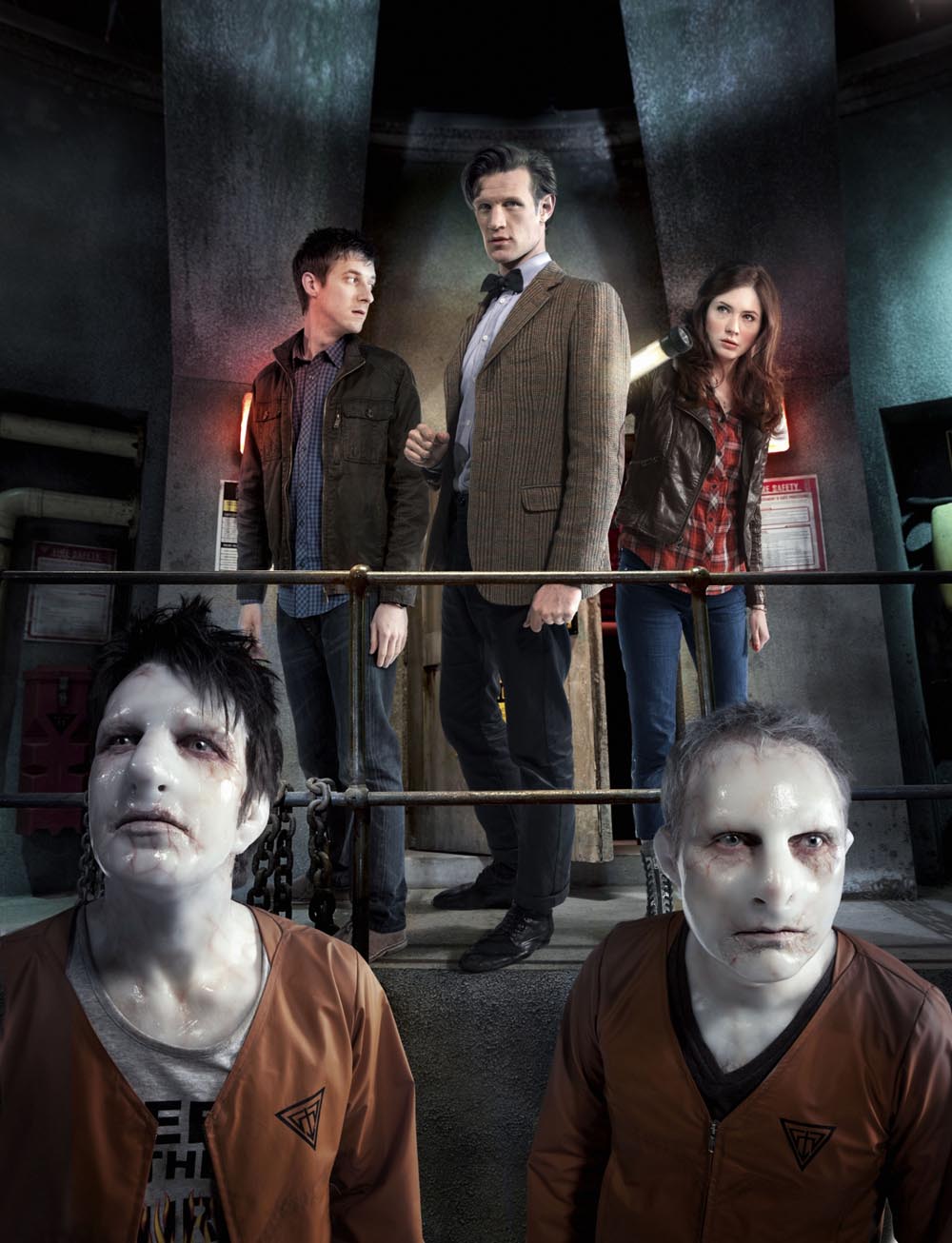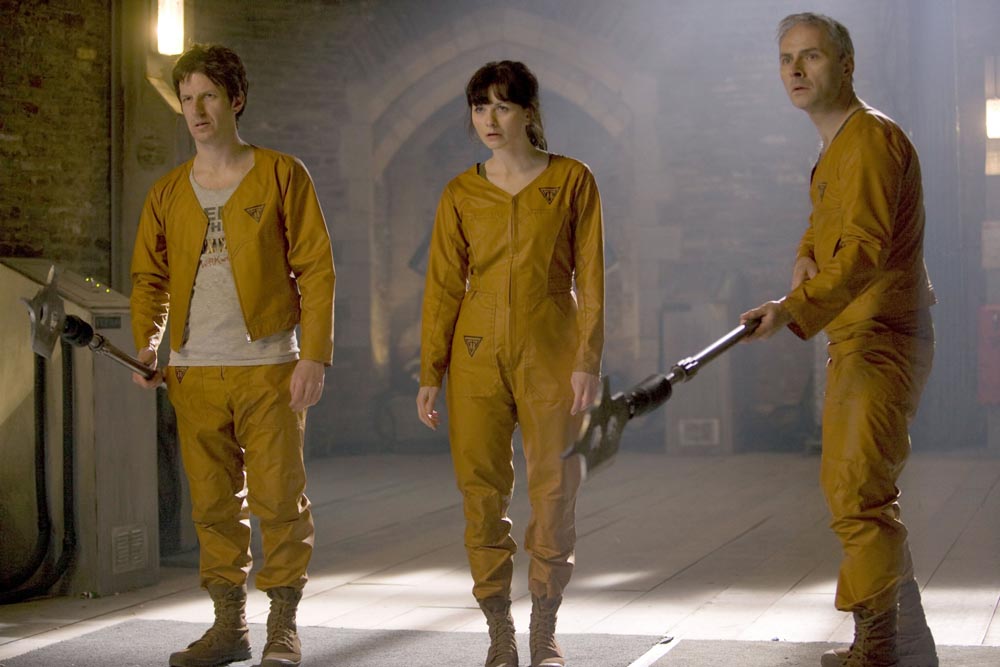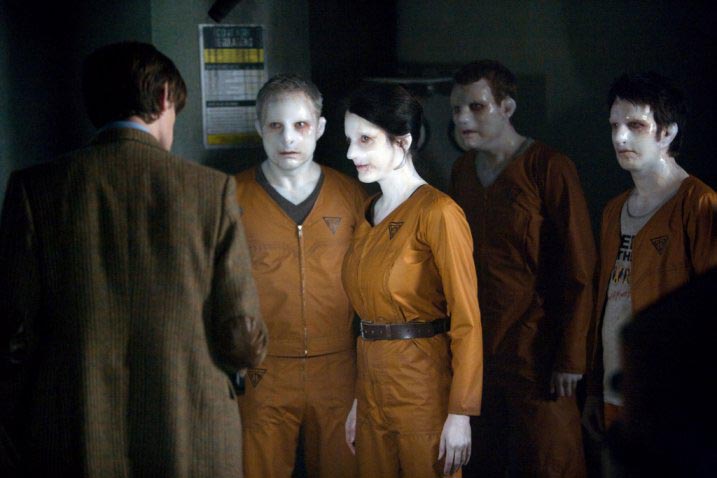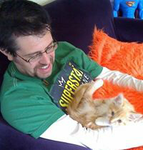Doctor Who "The Rebel Flesh Writer Interview
None
Exclusive interview with Matthew Graham about this weekend’s episode. VERY, MILD SPOILERS (less than you get in the trailers)
Life On Mars and Ashes To Ashes writer Matthew Graham makes a return to Doctor Who this weekend with the first part of the new two-parter, “The Rebel Flesh”/“The Almost People”. In this exclusive SFX .co.uk interview he discusses the story’s origins.

Most of the previews of this story have used the word “traditional” somewhere ( including ours ). Was your intention always to create a more “trad- Who ” adventure?
It wasn’t part of my brief. It was just that, with the story I needed to tell, there was no point in overcomplicating it in terms of structure. I think what’s going to be a lot of fun about this story is that it’s a Frankenstein’s monster tale and complexities that comes out of the story are moral and social complexities rather than timey whimey stuff.
So there didn’t seem to be any point in telling the story backwards, or throwing structural curveballs at the audience. It’s a big enough challenge for writers to just tell a good solid story in real time. Everything is in right the right order. I’m drawing more Troughtonesque references. I’m tapping into my inner Patrick.
How much of the story is yours and how much of it was material you had to include as part of the commission – Steven Moffat going, “We need this at this point in the season”?
That’s a good question. There was very little from Steven initially. I mean, I went to see him. I had a day with him sitting at his kitchen table eating every biscuit in the house. Really, all that Steven said was, "I want a two-parter, and I’m going to do something cataclysmically big in episode seven, and I want five and six to build towards seven. And there may be something I need you to do at the end of six that will lead you into seven, but I haven’t nailed it down in my own mind yet exactly how it’s going to be."
Sign up to the SFX Newsletter
Get sneak previews, exclusive competitions and details of special events each month!
And the only other thing he said, really, was, "I think it should be something to do with avatars that rebel." That was it.
My first reaction was, " Avatar , well, isn’t it going to be a bit like we’re just ripping off the big movie of the moment?" And he said, "Well, that’s your problem. Go away and don’t do that."
And that was pretty much all he put on the table. That, and the idea that the avatars, as he was calling them then, should look like they were made out of something that looked like eyeball matter; they should be white with lots of little red capillaries running through them. And that was it.
So then we just sat together and talked through ideas. And then I started writing. I didn’t even do a treatment. I mean, Steven and Russell, both of them, because they are proper, proper writers, they understand that writers hate writing treatments. Really, your imagination only starts to fly when you start writing the script. So we just talked about ideas and then I went off.
The thing that I really wanted to do was I wanted to set it in a monastery. I had this Name Of The Rose vibe in my head. Steven’s natural inclination was to say, "Well, I think the avatars, or gangers as we started to call them, probably work in a factory." And I said, "With respect, I’ve seen a lot of factories in Doctor Who , a lot of corridors with pipes. And I know we can’t get completely away from that because they need that kind of job, but can we set it in a monastery that’s been adapted into a factory?" And Steven said, "Oh that’s great, I love that." So that was how I got that tone.
And when I started writing, I created this thing called the Flesh, and that was all me, really. I thought, we’ve got to find a way of these avatars existing, so how do they exist? So, then I created the Flesh, and then I started thinking, "If you built the Flesh manufacturing facility in the chapel of the monastery, then it has spiritual overtones to it: Shelley-esque Frankenstein overtones. So it all started to spring from that, really.”
It also gives it an Alien 3 vibe.
Yes, I think that’s right. You’re highlighting all the references that we had really, which was Alien , The Thing , Frankenstein . That was the other thing that Steven did say after the first draft. He said, "They’re really exciting, but can you play with The Thing aspect a bit more? Who do we trust? Who is who?" So that comes out a lot more. Especially in the second part.

How did you find writing for Matt Smith?
Writing for Matt is great. Easy actually. Relatively easy. As it was writing for David. Because the characters that they’ve created have such a clear idiom. For me it felt like a very easy fit: the sort of hyperactive nutty professor locked too long away in the laboratory and just allowed out at the last minute. That was the pitch that Steven gave the writers for writing for Matt, and that served me very well. So I nailed, well I felt that I nailed, the character very quickly, and I loved writing for Matt.
You really do try to write for the character, not just a generic Doctor. Obviously, it was slightly easier for me writing for season six, because I’d already seen a whole season of Matt Smith. It would have been harder, obviously, for the writers of season five. But also, they sent me a couple of Steven’s scripts, I think it must have been one and two, just to show me how Steven was writing the Doctor this season.
But no, you can’t just write any old dialogue and hope Matt will make it sound like him. You try very hard to put in Mattisms, if you see what I mean. But you also try not to overdo the Mattisms. It’s a balance. Sometimes you get it right; sometimes you think, "Maybe I’ve overdone the Mattisms here." But with a dark story like "The Rebel Flesh" and "The Almost People" – I mean, "The Rebel Flesh" is kind of cranking it up, and "The Almost People" drops us over the other side – it’s pretty intense, so it’s really important to try to find moments of proper humour and silliness for Matt. You consciously try to do that.
Has Steven been giving the writers an edict that Rory must die in every episode?
Does he die in every episode? I suppose he does! He does die a lot. That’s a good point. You know what, with any other showrunner I’d say, "Oh, I dunno, they probably don’t know what they’re doing." But if anyone has a masterplan about Rory’s multiple deaths, it’ll be Steven. But I will be the last to know.
Will people be calling the second part “traditional” as well, or are there surprises in store?
I think partly why everybody is mentioning the traditional thing is partly that it’s coming off the back of one, two and four… I mean four is linear but it is unusual. It’s a beautiful character study rather than a thriller, isn’t it? And then you go into a two-parter, and the nature of two-parters is that often that first episode is, to some degree, a set-up, and it’s very hard to avoid that, really. So I think there is a feeling that episode five is – hopefully enjoyable and exciting – but more of a kind of, "We’re setting up the stakes, then we’re ratcheting the stakes up at the end."
Six twists and turns, but not structurally. It has twists and turns around the characters that might surprise you, and may even disturb you. Stuff goes on in "The Almost People" that you wouldn’t have seen, I don’t think, in the David Tennant era. And I mean that in a good way. It’s another thing that makes this era distinct and different from the previous era.
There’s been an almost complete change in cast and crew since you wrote “Fear Her”. What was it like coming back to the show?
It’s been great. It’s been fun. I mean I loved doing "Fear Her" and I loved coming back under a different regime and seeing the differences in the way that they work, but seeing the same commitment to storytelling, commitment to imagination, commitment to taking risks. There’s nothing like working on a show that’s firing on all cylinders, that feels confident in itself, and everyone understands what they’re making and feels brave and wants to push it.
And I’m very proud of these episodes. It was a huge challenge. It’s not twice as difficult to write a two-parter, it’s ten times as hard. And Steven was brilliantly supportive. Always with big thoughts. He wouldn’t worry about lines or footnotes; he would let you do what you wanted and then say, "I can see what you’re trying to do, here’s a suggestion of how to get even more out of what you’re trying to do." So as a showrunner, he was terrific.
In what ways is it more difficult to write a two parter?
Firstly, just trying to avoid a part one that’s merely a set-up for part two. That’s a huge challenge. But the biggest problem is not the first part, it’s the second part. It’s, "How do you move the story to another level?" How do you find a different setting for it? How do you ratchet it up to 11 on the Spinal Tap amplifier? How do you get it right up there and how do you end up not repeating – physically – the characters doing the same things, running down the same corridors. You don’t want them climbing the same ladders and things they were in the first part. And it’s very hard. Harder than Steven warned me.
I went through several radical rethinks on the second part to try and avoid that. But in the end I put my faith in the characters, the guest characters as well as the regulars. I said, "Look, actually, this isn’t about throwing tons more things into the plot, it’s about developing these characters in a way that’s surprising and exciting."
Originally I started episode two in another location entirely to throw everybody. It was a bit like cutting Alien off halfway through and relocating it in Nuneaton, and going, "Wow, how are we going to get back to the Nostromo now?" And I did that for a bit, and apart from the fact that it’s incredibly expensive, I quickly realised that that was just trying to throw fireworks into it for the sake of it. And that wouldn’t be where the audience’s hearts and minds would be. I had to have belief in my characters.
But there are a couple of big new things coming into the second part.
How scary were you allowed to be? Did you feel you could go slightly further?
Definitely, definitely. Steven was very clear. He said scare them. Right from the start. So, yeah. When I saw some of the stuff in five and six, even I was quite surprised. There are things that in "The Rebel Flesh" and particularly "The Almost People" where I was thinking, "That’s actually quite nasty!" Yeah, I think they are pretty scary.
It’s only adults that worry about it being too scary for children. Children love it. And it’s hard to scare kids these days because the average video game is scarier than most Doctor Who episodes from the ’60s and ’70s. But it’s scary in simple ways. It’s not scary in terms of violence. It’s scary in terms of staring eyes. I mean, if you don’t like staring eyes, do not watch episode six. It’s eyeballs-a-go-go in episode six. I should have called it "Eyeballs-A-Go-Go".


Dave is a TV and film journalist who specializes in the science fiction and fantasy genres. He's written books about film posters and post-apocalypses, alongside writing for SFX Magazine for many years.


